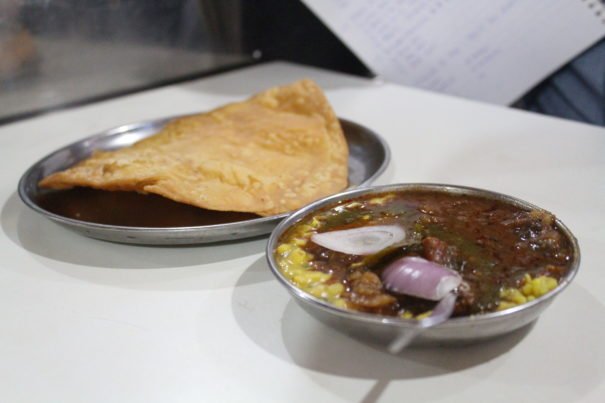
When the Breakfast Whole Is Greater Than the Sum of Its Parts

When the Breakfast Whole Is Greater Than the Sum of Its Parts
Dal-pakwan in Mumbai
It was a Sunday morning and I had to wake up at 7, but it was already 8:30 a.m. when I finally rubbed my eyes open. Like most weekend mornings, the many gin and tonics the night before were to blame. But I wasn’t planning to be up early on a Sunday morning for a walk or some exercise: I was up for food. Not just any food, but the special breakfast served at Vig’s Refreshments, in the Chembur Camp area.
It was 9 a.m. by the time I hailed an auto, the Mumbai tuk-tuk. I was sweating, and not just from the heat: I was also worried that by the time I reached Vig’s, they would have run out of their famous breakfast dish. So after a few minutes of suspense, I was grateful that they hadn’t. This is a dish you rarely find at restaurants: dal-pakwan. It’s a combination of lentil stew—split Bengal gram to be precise—served with fried and brittle pancakes made from refined flour.
A loud Gujarati family had grabbed the table next to me. “We must have this for breakfast every day,” said one woman to another. She paused for a bit before continuing: “…but then not have lunch.”
For a dish to scare a food-loving Gujarati like this, it must be seriously loaded with calories. Dal-pakwan certainly isn’t for days when you want to feel healthy. The crispy pakwan is dipped in lentil stew, which is topped with a spicy and tangy chutney. Every bite is a riot of textures and flavors.
My friend George once observed that in isolation, neither the dal nor the pakwan are anything special. It’s when they get together that the magic happens.
The dish belongs to the Sindhi community, which migrated to India after partition from Sindh province, now part of Pakistan. That’s why you get dal-pakwan and other Sindhi culinary delights in the ‘Camp’ neighborhood: it was here, in a refugee camp, that many Sindhis found shelter after arriving in India.
On my way out, I tried to make small talk with the elderly gentleman at the cash counter about the dish. He was dressed in a white kurta, or long shirt. He told me off by saying “Beta, isme baat kya karna hai, isme toh bas khaana hai”—meaning, there is nothing to say about this dish; it’s only for eating. I don’t disagree.